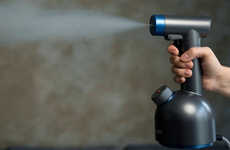
This Newly Developed Material Means Going to the Dry Cleaner Less
Alyson Wyers — August 29, 2014 — Eco
References: smithsonianmag & fastcoexist
If you are looking for ways to reduce your carbon footprint and also find yourself making multiple trips to the dry cleaner, this self-cleaning cashmere is a fabric you might want to invest in for the future. Researchers from City University at Hong Kong's School of Energy and Environment have been developing self-cleaning fabrics since 2002. Their strain of cashmere doesn't merely repel stains, it makes them disappear using an extremely thin coating of invisible anatase titanium dioxide. When placed in sunlight for 24 hours, a chemical reaction takes place, getting rid of bacteria, dirt and stains.
Assuming the new self-cleaning cashmere material is safe, researchers hope their new technology will be integrated into clothing soon. Thus far, the clothing has tested to be safe to wear.
Assuming the new self-cleaning cashmere material is safe, researchers hope their new technology will be integrated into clothing soon. Thus far, the clothing has tested to be safe to wear.
Trend Themes
1. Self-cleaning Fabrics - There is an opportunity for businesses to develop and market self-cleaning fabrics that eliminate the need for traditional cleaning methods.
2. Sustainable Fashion - The development of self-cleaning cashmere demonstrates the potential for sustainable fashion practices that reduce the impact of clothing production on the environment.
3. Sunlight-activated Technologies - The use of anatase titanium dioxide in self-cleaning cashmere showcases the disruptive potential of sunlight-activated technologies in various industries beyond clothing.
Industry Implications
1. Textile Industry - The textile industry can leverage the development of self-cleaning fabrics to create innovative and eco-friendly clothing options.
2. Cleaning Industry - The discovery of self-cleaning materials presents an opportunity for the cleaning industry to adapt and develop new products that cater to changing consumer preferences.
3. Material Science - The use of anatase titanium dioxide in self-cleaning cashmere highlights the potential for advancements in material science with applications in various sectors like construction, automotive, and more.
5
Score
Popularity
Activity
Freshness























